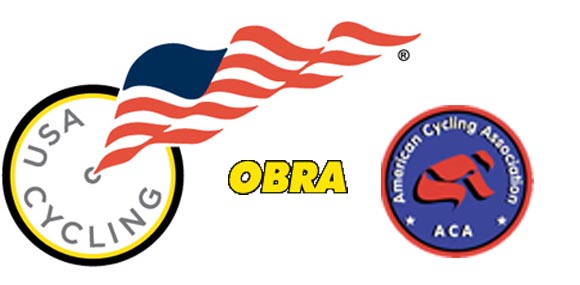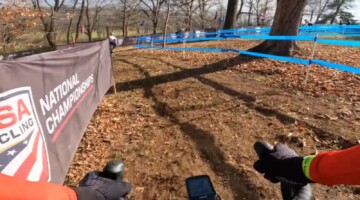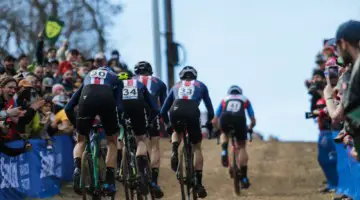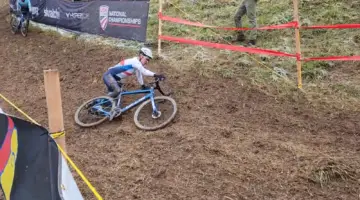UPDATE: USA Cycling’s response to this report appears in a separate post: USA Cycling Responds: Cyclocross Support and Independent Sanctioning Bodies. We hope that our readers will chime in with comments below, as well as via Twitter as we continue to bring you updates. Also, be sure to check the NEW POLL on our homepage: Is USA Cycling doing a good job of supporting cyclocross? Your opinion matters!
While in Bend, Oregon, this past weekend for the Deschutes Brewery USGP, several sources told Cyclocross Magazine that USA Cycling has been applying pressure on that series as well as on independent sanctioning bodies such as the Oregon Bicycle Racing Association (OBRA). The sources have reported to CXM that USA Cycling will no longer allow dual-sanctioned events, where Elite and series categories must hold a UCI or USAC license but other lower categories can be run under another sanctioning body, such as OBRA. Such an enforcement will directly impact the USGP races in Bend, and perhaps road events such as the Cascade Cycling Classic, an NRC event which also takes place in Bend. We have also learned that there may be a USAC move to prevent its officials from also working as officials of other sanctioning bodies which, again, seems to specifically target Oregon.
At the beginning of this year, USA Cycling began to enforce a UCI rule which stipulates that a member of a UCI trade team may not participate in a race which isn’t sanctioned by the UCI or USAC without an exception for that event. The rule was not new, but its enforcement was. That rule enforcement coupled with USA Cycling’s expressed intention to establish its own local cycling association in Colorado were among the factors which led the American Cycling Association to cease to be an independent sanctioning organization after 13 years, and to fall under the USAC umbrella as Colorado’s local association. USA Cycling also recently ceased offering category reciprocity – in other words, racer categorizations from other bodies no longer apply to USA Cycling categories. And points used to seed Masters National Championships in USA Cycling’s new ranking system also can only be earned in USAC-sanctioned events: another recent adoption which potentially weakens independent bodies.
Kenji Sugahara, the executive director of OBRA, and Brad Ross, who promotes a plethora of high-profile races both under USA Cycling and OBRA, provided their input today. Ross’ perspective is unique: with USA Cycling he has been the race director of the USGP final weekend for its trips to Portland, and now Bend, for the past several years; he’s the race director of the Cascade Cycling Classic, the biggest stage race in the Northwest; he was the National Championship director in 2003, 2004, 2009 and 2010; and he is scheduled to be race director of the 2013 Masters World Cyclocross Championships. Ross also promotes several high-profile OBRA events, including the Cross Crusades, the biggest cyclocross series in the world by participation.
We have also attempted to contact Steve Johnson, CEO of USA Cycling, and Sean Petty, COO of USA Cycling, for their feedback and clarifications. We have not yet heard back from either of them, but Andrea Smith, communications director of USAC, had this to say: “There simply haven’t been any discussions between USA Cycling and OBRA on this and it is the first we’ve heard of it.”
We have also reached out to the promoters of the USGP series. “We have no comment on the subject as we have heard from neither USAC nor OBRA on the issue to date,” USGP series director Joan Hanscom told us via email. “We are secure in our relationship in Bend and will be back in 2012.”
Input from Brad Ross, Race Director and Promoter under Both USAC and OBRA
CXM: We are putting together information regarding any changes afoot with the relationship between USA Cycling, OBRA and the USGP, I suspect you have a little more of the scoop there.
Brad Ross: Long story short: I think USAC is trying to put OBRA out of business. I don’t understand what the motivation is – they’re going to mandate that the officiating staff will have to choose [between the two]. So if you’re an OBRA official, you’ll no longer be allowed to be a USAC official. In my opinion it’s going to hurt USAC more than OBRA.
I don’t think USAC has told most Oregon officials yet – and I think most of them will choose to stay with OBRA, just because there are so many more OBRA events [in Oregon] than USAC events. It’s already pissed me off, and I’ve been one of the big champions of bringing USAC back into Oregon on a somewhat limited basis.
CXM: Previously USAC prohibited riders on UCI teams from competing in events sanctioned by other bodies. The other thing we’ve heard is that USAC is cracking down on events like the USGP, preventing them from sanctioning with different bodies for different categories.
Ross: Oh yeah, I think this last weekend was the last time you’ll ever see a dual-sanctioned event. Of course, they’re blaming it on insurance risk, but it’s bullshit. In fact, [USAC] tried to not allow it just this last weekend. Mid-season they tried to crack down on that for [USGP Bend]. We’ve been putting on dual-sanctioned events for 10 years. The Cascade Classic has always been a dual-sanctioned event, the GP has been ever since it’s been here in Oregon. There’s never been a problem with that in the past.
CXM: Who is communicating that from USA Cycling about the sanctioning bodies?
Ross: [USAC President and CEO] Steve Johnson.
CXM: So will there be a USGP in Oregon next year?
Ross: Yeah, but we’ll probably have to go all USAC on it, which will probably hurt our numbers – definitely our age-group races and CAT 3/4s. The majority of Oregon riders don’t carry a USAC license, and they won’t want to buy it for one event. As expensive as the USGP is already, forcing somebody to buy a $60 license on top of that is just going to kill that participation. USAC is really showing they don’t give a shit about participation. Oregon and OBRA is all about encouraging participation; USAC is all about making sure that the Elite riders are happy and they don’t [care] about anybody other than that any more.
CXM: Do you think these actions will have an impact on OBRA?
Ross: It isolates us more, and it feels like USAC wants to come after us even harder. I don’t know, but it’s not going to be good. It seems like we’re at war instead of being partners – and I’d rather be partners with USAC.
The thing is, I get along great with everybody at USAC except the top-tier people. I deal directly with [national events director] Kelli Lusk, and I get along with all of the officiating staff, and [mountain bike and cyclo-cross program director] Marc Gullickson and I are very close friends. But way up at the top it seems like they’ve completely lost touch with what’s important. What do they want to accomplish? I don’t know.
I was once a pioneer for bringing USAC back to Oregon on a limited basis. But they have burned that bridge. They have lost sight of what is important. I personally am on a mission to get them out of cyclocross all together. Otherwise, they will destroy it like they did mountain bike racing.
Input from Kenji Sugahara, Executive Director of OBRA
CXM: What have you heard about officials needing to choose between USAC and OBRA?
Kenji Sugahara: As far as I know that’s not true, and even if it is, we already know which way most officials would go – 99.9 percent are going to stay with us.
CXM: How has your relationship with USA Cycling changed over the years? Was there ever a common ground and understanding?
Sugahara: I’ve been totally cool with them – I hung out with Steve Johnson at Nationals, and I’ve been trying to drill it into their heads that we’re on the same side here. I think they’ve forgotten that idea, and they don’t realize we’re out there trying to get more people racing, just like they are. You look at OBRA and we’re the most successful bike racing organization in the United States, period. Per capita we have way more that USA Cycling, and we have a great grassroots program. I’m not going to just bash on USA Cycling – they do some good things; frankly, they do the Elite side really well. They take Juniors and turn them into Elites, which is great. But the problem is, there’s no support for grassroots cycling. You need to grow the grassroots and make the pool bigger, then it’s more likely you’re going to find the really good athletes. You’re going to find that guy on the couch munching potato chips and playing X-Box who could be a potential bike racer – he says, ‘Wow! This looks pretty cool, there’s a lot of people participating, maybe I’ll give it a shot.’ Next thing you know, he’s the next great thing, the next Jacob Rathe [an OBRA racer who has gone on to the Garmin-Cervelo World Tour team].
There’s also the stereotype of the snobbish racers who race on their $10,000 carbon bikes, and you look at Oregon and we completely break the mold. We’ve got folks on steel-tubed bikes with down tube shifters doing really well. You take guys like that and you give them the opportunity. If you have to spend a lot more money for races and licenses, nobody’s going to do it. You get more people out racing bikes – that’s what matters.
CXM: How do you perceive USAC’s actions, what are they trying to do in Oregon?
Sugahara: I have no idea what their intentions are. I could speculate that their trying to get rid of us. We have a good product, and it’s going to be very difficult for them to compete. I want to work with them and have a good relationship with them, but why are they trying to destroy an organization that has built up a great thing that a lot of people love and a lot of people enjoy?
CXM: So what do you think happened with ACA in Colorado?
Sugahara: I know Chris [McGee, executive director of ACA] very well. I told Chris straight up: You can’t compete on price; you’re more expensive than USA Cycling. There’s no incentive for promoters to go with him, and that’s a huge thing. In the Colorado market, USA Cycling is already there. And I know USA Cycling was going to form a local association there if ACA didn’t cave. It was “come with us or face extinction,” and I don’t blame them.
CXM: Elite racing in Colorado is a big part of the scene there, and there are tons of pros there. When USAC made the ruling that a rider on a UCI team couldn’t compete in a non-USAC event, that helped push that agenda long there. That doesn’t seem to be having the same impact in Oregon?
Sugahara: Yeah, it’s a few racers.
CXM: None of this will have a huge impact on OBRA, is that a fair statement?
Sugahara: It’s gonna do nothing, zero, zilch, zippo. Quote me on that. It’s going to suck in terms of losing stage races, but it’s going to hurt the promoter, it’s going to hurt Chad [Sperry, promoter of Cascade, Mt Hood Cycling Classic]. Who will want to pay $300, or close to it, for one stage race, including [USAC] license. A lot of people didn’t do ’Cross Nats because of that – how much is it per minute?
CXM: What about someone in Oregon who does want to be successful on the Elite level, or who wants that Cat 1 USAC upgrade?
Sugahara: It really sucks. Are our races less competitive than the others? Are our fields that much lower quality than other states? No. But [the lack of category reciprocity] does affect them. I encourage these guys to go and do some Washington races. Our neighbors to the north are awesome, and Erik Anderson, the WSBA [Washington USAC regional chapter] president is a great guy, he puts on good races. [Note: Erik Anderson is VP, Joe Holmes is president]
Here’s the biggest thing I want to emphasize: I really want to work with USA Cycling. I really like the people there. I hope they’ll open their eyes and work with us, not against us. As I said before, we’re all on the same side to get more racers out there and we can’t lose that vision. We’re here to support the sport of cycling, and I’d like to help them out by giving them some of the ideas I have.
Stay tuned to CXMagazine.com as we hope to bring you more perspectives on this important cyclocross story.



























